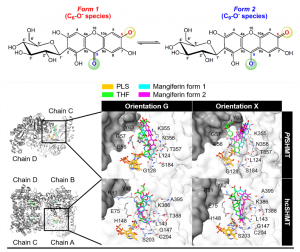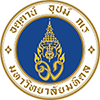
Serine hydroxymethyltransferase (SHMT) is a key enzyme in the deoxythymidylate synthesis cycle, essential for pathogen proliferations, including malaria parasite. Therefore, SHMT is an attractive target for antimalarial and anticancer drugs. In this study, we have demonstrated for the first time that mangiferin, which is a polyphenolic xanthone glycoside found in various botanical sources, including mango (Mangifera indica L.) leaves, could inhibit Plasmodium falciparum and human cytosolic SHMTs. The in-silico studies by molecular docking and molecular dynamic (MD) simulations also revealed important binding moieties interacting with active site residues of SHMT. These findings not only demonstrate a new bioactivity of mangiferin, but also serve as ground for the future development of mangiferin as a potent antimalarial and anticancer drug.
Reference
Maenpuen S, Mee-Udorn P, Pinthong C, Athipornchai A, Phiwkaow K, Watchasit S, Pimviriyakul P, Rungrotmongkol T, Tinikul R, Leartsakulpanich U, Chitnumsub P. Mangiferin is a new potential antimalarial and anticancer drug for targeting serine hydroxymethyltransferase. Arch Biochem Biophys. 2023 Sep 1;745:109712.
DOI: 10.1016/j.abb.2023.109712.
| Relevant SDGs | |
|---|---|
| BC investigator | |
 Asst. Prof. Ruchanok Tinikul Asst. Prof. Ruchanok Tinikul |
|
